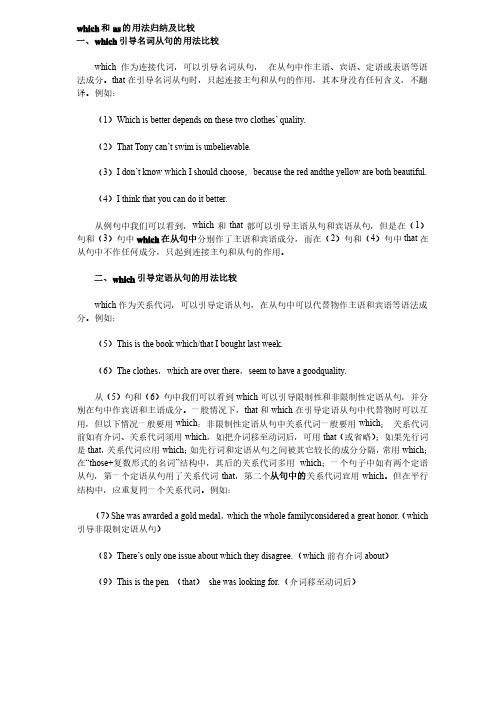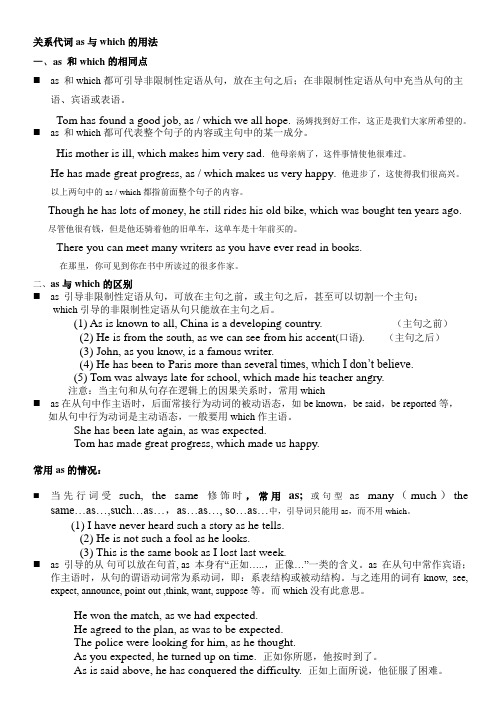as和which的用法区别
非限制性定语从句which和as的用法汇总一篇

非限制性定语从句which和as的用法汇总一篇非限制性定语从句which和as的用法 1非限制性定语从句which和as的用法一、相同之处当从句位于主句之后,引导词指代整个主句所表达的全部意义时,as 和which可以互换。
如:The elephant is like a snake,as/which everybody can see.大家都看得出,这头大象像条蛇。
A big earthquake occurred there last night,as/which was reported on TV.据电视报道,昨夜那里发生了大地震。
She is from Shanghai,as/which I know from her accent.她来自上海,那是我从她的口音知道的。
二、不同之处1、as引导非限制性定语从句时,位置比较灵活,可位于主句之前,也可位于主句之中或之后;而which引导非限制定语从句只能位于主句之后,不能位于主句之前。
如:_______ is known to everybody,the moon travels round the earth.A.ItB.AsC.ThatD.Which答案:B_______ is mentioned above,the number of the students in senior highschools is increasing.A.WhichB.AsC.ThatD.It答案:BAir,as we know,is a gas.众所周知,空气是一种气体。
He is very careful,as his work shows.他的工作表现表明他非常谨慎。
as引导非限制性定语从句常有“如同.那样”的含义,因此在一些固定结构中,如:as we know;as is known to all(众所周知)as we all can see(正如我们大家都能看到的那样)as has been said before/above(正如前面所述)as might be imagined(可以想象得到)as might be expected(正如所预料的那样)as is often the case(情况通常是这样)以上种种固定搭配,一般不能用which代替as。
as和which引导定语从句的区别

as和which引导定语从句的区别as和which引导定语从句的区别导语:As 和which都可以引导非限定性定语从句,在用法上有一些区别。
欢迎阅读!1.as 和which都可以在定语从句中作主语,宾语,既可修饰一个词也可修饰前面的整个句子。
A.She accepted his proposal, as(which)was natural.她接受了她的求婚,这是自然而然的。
B.The boy is pretty handsome, as(which)we can see in our classroom.这个男孩非常的帅气,正如我们在教室看到。
2.as 在非限定性定语从句中的使用2.1 as可以放在主句之前,主句之后,也可以放在句中,可以说位置很灵活。
但是which常用在主句之后A.As we know,technology just like a engine to push the development of economics.众所周知,技术就像是引擎推动着经济的'发展。
B.The diva,as you know, is famous throughoutthe world.这个女歌剧演唱家,正如你知道的,在全世界都出名。
C.He has stood her up, which I don`t believe.他没有赴约,这事我不相信。
2.2 as与the same,such 连用时,用as。
A.This is the same phone as I have borrowed from my sister.这个手机和我向我姐姐借的一样。
B.I have never had such a chance to make a speech as I always imagined.我从没有这样一个机会去演讲,正如我一直想象的那样。
2.3在从句中谓语动词为被动语态,缺少主语时用as,不用which。
as which在定语从句中 区别

as和which引导非限制性定语从句的区别1.as引导的非限制性定语从句1)位置灵活,可以置于主句的句首、句中或句末;2)先行词不可是一个词,必须是整个主句或主句的部分内容;3)有“正如、像”等意思,表依据、评论(、态度、看法)等;如:a.This elephant is like a snake,as anybody can see.像任何人都能看见那样,这头象像条蛇。
b.He failed in the exam, as we had expected.c.Tom has passed the test, as everybody knows.正如每个人所了解的那样,汤姆通过了考试。
【比较:Bamboo is hollow,which makes it very light.竹子是空的,这就使得它很轻。
】4)常用以下谓语动词的主、被动语态:know, see, say, expect, imagine, hope, believe,announc e, suggest, report, point out…,例:a.主动(做宾):as we all know, as you know,as everybody knows;as you see, as wecan see,as we have seen, as anybody can see; as was expected; as we canimagine,as we have imagined…a)As we all know, the earth is round.b)He was a foreigner, as I know from his accent.c)Mike, as we expected, attended the meeting.像我们所期望的那样,迈克参加了会议。
b.被动(做主):as is known to everybody,as is known to all; as has been expected;as is often the case (with …),as has been pointed out, as is usual with, as isreported in the newspaper…a)He is an honest man, as is known to all.b)As is often the case with young people, he was overconfident.c)He wasn't unconscious,as could be judged from his eyes.他并未失去知觉,这从他的眼神可以判断出来。
which和as的用法归纳及比较

which 和as 的用法归纳及比较一、which 引导名词从句的用法比较which 作为连接代词,可以引导名词从句,作为连接代词,可以引导名词从句,在从句中作主语、宾语、定语或表语等语法成分。
that 在引导名词从句时,只起连接主句和从句的作用,其本身没有任何含义,不翻译。
例如:译。
例如:(1)Which is better depends on these two clothes’ quality.(2)That Tony can’t swim is unbelievable.(3)I don’t know w I don’t know which I should choosehich I should choose ,because the red andthe yellow are both beautiful.(4)I think that you can do it better.从例句中我们可以看到,which 和that 都可以引导主语从句和宾语从句,但是在(1)句和(3)句中which 在从句中分别作了主语和宾语成分,而在(2)句和(4)句中that 在从句中不作任何成分,只起到连接主句和从句的作用。
从句中不作任何成分,只起到连接主句和从句的作用。
二、which 引导定语从句的用法比较which 作为关系代词,可以引导定语从句,在从句中可以代替物作主语和宾语等语法成分。
例如:分。
例如:(5)This is the book which/that I bought last week.(6)The clothes ,which are over there ,seem to have a goodquality.从(5)句和(6)句中我们可以看到which 可以引导限制性和非限制性定语从句,并分别在句中作宾语和主语成分。
一般情况下,that 和which 在引导定语从句中代替物时可以互用,但以下情况一般要用which :非限制性定语从句中关系代词一般要用which ; 关系代词前如有介词、关系代词须用which ,如把介词移至动词后,可用that (或省略);如果先行词是that ,关系代词应用which ;如先行词和定语从句之间被其它较长的成分分隔,常用which ;在“those+复数形式的名词”结构中,其后的关系代词多用which ;一个句子中如有两个定语从句,第一个定语从句用了关系代词that ,第二个从句中的关系代词宜用which 。
关系代词as与which的用法

关系代词as与which的用法一、as 和which的相同点⏹as 和which都可引导非限制性定语从句,放在主句之后;在非限制性定语从句中充当从句的主语、宾语或表语。
Tom has found a good job, as / which we all hope.汤姆找到好工作,这正是我们大家所希望的。
⏹as 和which都可代表整个句子的内容或主句中的某一成分。
His mother is ill, which makes him very sad. 他母亲病了,这件事情使他很难过。
He has made great progress, as / which makes us very happy.他进步了,这使得我们很高兴。
以上两句中的as / which都指前面整个句子的内容。
Though he has lots of money, he still rides his old bike, which was bought ten years ago.尽管他很有钱,但是他还骑着他的旧单车,这单车是十年前买的。
There you can meet many writers as you have ever read in books.在那里,你可见到你在书中所读过的很多作家。
二、as与which的区别⏹as 引导非限制性定语从句,可放在主句之前,或主句之后,甚至可以切割一个主句;which引导的非限制性定语从句只能放在主句之后。
(1) As is known to all, China is a developing country. (主句之前)(2) He is from the south, as we can see from his accent(口语). (主句之后)(3) John, as you know, is a famous writer.(4) He has been to Paris more than seve ral times, which I don’t believe.(5) Tom was always late for school, which made his teacher angry.注意:当主句和从句存在逻辑上的因果关系时,常用which⏹as在从句中作主语时,后面常接行为动词的被动语态,如be known,be said,be reported等,如从句中行为动词是主动语态,一般要用which作主语。
as和which引导非限制性定语从句的区别

as 和which引导非限制性定语从句的区别1,as引导的非限制性定语从句,位置灵活,可以置于主句的句首、句中或句末;先行词不可是一个词,必须是整个主句或主句的部分内容;有“正如、像”等意思,表依据、评论(、态度、看法)等;如:This elephant is like a snake,as anybody can see.像任何人都能看见那样,这头象像条蛇。
He failed in the exam, as we had expected.Tom has passed the test, as everybody knows. 正如每个人所了解的那样,汤姆通过了考试。
【比较:Bamboo is hollow,which makes it very light.竹子是空的,这就使得它很轻。
】常用以下谓语动词的主、被动语态:know, see, say, expect, imagine, hope, believe, announce, suggest, report, point out…, 例:主动(做宾):as we all know, as you know, as everybody knows; as you see, as we can see, as we have seen, as anybody can see; as was expected; as we can imagine, as we have imagined…As we all know, the earth is round.He was a foreigner, as I know from his accent.Mike, as we expected, attended the meeting.像我们所期望的那样,迈克参加了会议。
被动(做主):as is known to everybody, as is known to all; as has been expected; as is often the case (with …),as has been pointed out, as is usual with, as is reported in the newspaper…He is an honest man, as is known to all.As is often the case with young people, he was overconfident.He wasn't unconscious,as could be judged from his eyes.他并未失去知觉,这从他的眼神可以判断出来。
as和which引导非限制性定语从句的区别
As与which引导非限定性定语从句辨析1.as引导非限制性定语从句,只代表主语或主句的一部分所表达的意思(不能指代某个名词或代词),可以放在主句前,后或中间,在从句中作主语或宾语、例如:As is known to all, he is the best student in our class. (as指代整个句子,作主语,置于句首)He opposed the idea, as could be expected. (as 指代整个句子,作主语,置于句末)As we all know, he studies very hard. (as 指代整个句子,作宾语,置于句首) Taiwan is, as you know, an inseparable part of China. (as指代整个句子,作宾语,置于句中)2.在非限制性定语从句中,which和as引导定语从句时的区别:a. which引导的从句不能放在主句前,而as引导的从句则既可以放在主句前,也可以放在主句后。
例如:As (正确)is often the case, he is absent.Which (错误)He saw the girl,as (正确)He had hoped.Which (正确)b.用能做关系代词,as和which都可以指代一个句子,但as有“正如”、“就像”之意,which则没有此含义。
He is a foreigner, as I know from his accent. (as指代一个句子,意为“正如”、“就像”)He has to work on Sunday, which he doesn’t like. (which指代一个句子,没有“正如”、“就像”)c.当从句的谓语动词是be或相当于联系动词的seem, become等时,可用as或which作主语。
但当从句的谓语是行为动词时,只能用which作主语。
as和which在非限制性定语从句中的区别
as和which在非限制性定语从句中的区别作者:王艳霞来源:《新课程·教师》2010年第10期在非限制性定语从句中as和which是经常使用的关系代词,他们都可以指代整个主句,相当于and this或and that,但它们还是有各自的使用规则,有所区别。
一、从意义上看,as一般指代人们日常生活中都知道的常识性的东西,因而常被译成“正如”;而which代指前面主句的内容,意为“这一点”。
二、从位置上看,as引导的非限制性定语从句,既可放在主句前又可置于主句后,有时还可插入主句中,而which引导的非限制性定语从句只能置于主句之后。
例如:The weather turned out to be very good,which was more than we could expect.结果天气非常好,这一点我们没有料到。
As is known to everybody, the moon travels round the earth once every month.The moon travels round the earth once every month,as/which is known to everybody.众所周知,月亮每月绕地球转一次。
三、当定语从句放在主句后面时,一般用as和which都可以,但也不总是这样,例如:1.当非限制性定语从句是否定句或表示否定意思时只能用which。
如:He came here very late,which was unexpected(not expected).他迟到了,这是意料之外的。
2.当as在从句中作主语时,后面常接动词的被动语态,如be known、be said、be reported、be announced等。
如果从句是主动语态,一般用which作主语,如:She has been absent again,as is expected.她又缺席了,这在意料之中。
关系代词as与which引导的非限制性定语从句的区别
关系代词as与which引导的非限制性定语从句,其先行词都可以是整个主句,指代主句的整个意思。
但as和which具有不同的词义、句法和用法。
1. as引导的从句表示说话人的看法、态度、解释或评论引导定语从句时,as仍具有“正如,像,由……可知”等意思,翻译时有时可不必译出。
as定语从句常含有这些动词:see, know, hear, watch, remember, say, tell, show, expect, guess等,这类动词与as连用几乎成了一种固定搭配。
as引导的此类从句可以置于句首、句中或句尾。
如:The famous magician Liu Qian, as we all know, is from Taiwan. 众所周知,著名魔术师刘谦是台湾人。
There is a net bar around here, as I remember. 我记得这儿附近有一家网吧。
As is often the case, girls like dolls while boys like guns. 女孩子喜欢玩具而男孩子喜欢枪,这是常见的情况。
2. which引导的从句对主句所叙述的事情进行补充说明,表明事物的状态或结果which此时指前面主句所提到的这件事,常译为“这一点,这件事”等。
这时它所引导的从句与主句之间常含有并列、因果关系。
注意,它引导的从句不像as那样位置灵活,它只能位于主句的后面。
如:He changed his mind again, which made us all angry. 他又改变了主意,这使我们大家都生气了。
She tore up my photos, which (=and that) upset me.她撕碎了我的照片,这使我很不安。
3. 在从句中作定语或介词的宾语时,要用which,不用asJenny might come, in which case I'll ask her. 詹妮可能会来,要是那样的话我就去问她。
在非限制性定语从句中,连接词as和which的区别
在非限制性定语从句中,连接词as 和 which 的区别关系代词 as 用于引导非限制性定语从句时,应注意以下三点:一. as引导的非限制性定语从句位于句末时,一般可以和which互换。
the author was brought up in a small village, as (which) is recounted in some of his stories.作者是在一个小村庄里长大的,这个问题在他的一些小说了就被提到过。
she is extremely popular among the students, as (which) is common knowledge.她在学生中间很受欢迎,这是普遍知道的。
但是,当主句是否定句时,as和which就不能互换,因为as引导的非限制性定语从句不包含否定意义。
spiders are not insects, as many people think.蜘蛛不是昆虫,而许多人却认为蜘蛛是昆虫。
二. as引导的非限制性定语从句可以放在句子的最前面,而which 引导的定语从句不能放在句首。
as is often the case, the girl forgot to her dictionary.(不能用which)经常是这样子的,那个女孩忘了带字典。
as you will find out, all is now settled.你将会看到这样的情况,一切都已搞定了。
三. as引导的非限制性定语从句可以放在句子的中间,which引导的定语从句也可以放在句子的中间。
water, which is a clear liquid, has many uses.水是一种透明的液体,有许多用途。
Chinese Taiwan is, as you know, an inseparable part to china. 众所周知,中国台湾是中国不可分割的一部分。
- 1、下载文档前请自行甄别文档内容的完整性,平台不提供额外的编辑、内容补充、找答案等附加服务。
- 2、"仅部分预览"的文档,不可在线预览部分如存在完整性等问题,可反馈申请退款(可完整预览的文档不适用该条件!)。
- 3、如文档侵犯您的权益,请联系客服反馈,我们会尽快为您处理(人工客服工作时间:9:00-18:30)。
非限制性定语从句中的as和which
■as 和which的相同点
(1) as 和which都可引导非限制性定语从句,放在主句之后;在非限制性定语从句中充当从句的主语、宾语或表语。
如:
Tom has found a good job, as / which we all hope. 汤姆找到了一件好工作,这正是我们大家所希望的。
(2) as 和which都可代表整个句子的内容或主句中的某一成分。
如:
His mother is ill, which makes him very sad. 他母亲病了,这件事情使他很难过。
He has made great progress, as / which makes us very happy. 他进步了,这使得我们很高兴。
以上两句中的as / which都指前面整个句子的内容。
Though he has lots of money, he still rides his old bike, which was bought ten years ago. 尽管他很有钱,但是他还骑着他的旧单车,这单车是十年前买的。
There you can meet many writers as you have ever read in books. 在那里,你可见到你在书中所读过的很多作家。
■as与which的区别
(1) 当先行词前面有so + adj. + a / such + (a) + adj. , the same等词修饰时,引导词只能用as,而不用which。
如:
She is so nice a girl as we all like. 她是个我们大家都喜欢的如此好的女孩。
It is such an interesting book as we all want to read. 它是本我们大家都想读的有趣的书。
上面两句中的as就不能用which替换。
(2) as 在从句中常作宾语;作主语时,从句的谓语动词常为系动词,即:系表结构或被动结构。
如:
As is said above, he has conquered the difficulty. 正如上面所说,他征服了困难。
(3) 当非限制性定语从句放到主句的前面时,引导词只能用as,而不用which。
如:
As is planned, we got there before eight. 正如计划,我们再把店前到达了那儿。
(4) As引导的非限制性定语从句指表示积极的意义,与主句是顺理成章的关系,绝不能与之矛盾。
若非限制性定语从句表示一种消极的意义,则只用which。
如:
He has succeeded in his career, as / which we all hope. 他在事业中成功了,这正是我们大家所希望的。
Her grandma died last week, which made her very sad. 她的奶奶逝世了,这使得她很悲伤。
(5) 当非限制性定语从句的引导词前面有介词时,只能用which, 而不可用as。
如:
He has a new computer, for which he paid nearly ten thousand yuan. 他有一台新电脑,这台电脑花了他将近一万元。
6) 当关系代词代替主句中的宾语从句或复合结构(如:宾+补;不定式短语;动词-ing形式短语等) 时,一般只能用which, 而不用as。
如:
She told us that there was something wrong with her bike, which was true。
她告诉我们说她的单车出了毛病,这话是真的。
He asked her to help him with his English, which she did. 他请她教他学英语,她的确帮了。
(7) 关系代词仅代表主句中的谓语部分时,从句中谓语部分被省略而只保留情态动词的否定式或助动词否定式,引导词一般只用which, 而不用as。
如:
He speaks En glish very fluently, which I can’t. 他的英语说得非常流利,这我可不行。
(8) 关系代词作定语修饰后面的名词时,一般只用which, 而不用as。
如:
He suggested going swimming in the river, which idea we agreed with. 他提议去河里游泳,我们就同意了他的想法。
(9) 当关系代词仅代表主句中单个的名词时,一般只用which, 而不用as。
如:
He sent me a beautiful present, which I valued very much. 他给寄来了一件精美的礼物,我对它非常珍视。
(10) as 在非限制性定语从句中,还常跟such连用。
如:
There was a look of love in the teacher’s eyes, such as mothers have for their children. 老师眼里流露出对他喜爱的神情,就好像母亲对孩子的喜爱。
(11) as常用于一些固定结构中。
如:
as is well known / as we all know 众所周知;as is said above 正如上面所说;
as might be imagined 正像所想象的那样;as is reported 如报道所说;
as has been pointed 如所指出的那样;as is expected 正如所料。
